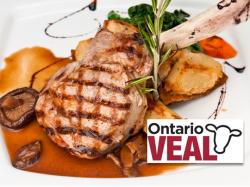Study: New Canadians Prefer Taste, Quality Of Ontario Meats
March 3, 2015 | 4 min to read

An extensive new study shows that new Canadians prefer the taste and quality of Ontario meat over imported product.
The study looked at the eating patterns, shopping habits, and taste preferences of new Canadians of African, Middle Eastern, South Asian, Southeast Asian, Caribbean, and European descent as they relate to the consumption of veal, goat, lamb and mutton, and rabbit.
The research was commissioned by the Ontario Sheep Marketing Agency and the Ontario Livestock Alliance, which included current members Ontario Veal and Ontario Goat, and past member Ontario Rabbit.
“Although there are many differences between the various ethnic backgrounds, the one thing everyone shares in common is a preference for the taste and quality of Ontario-produced meats over those that are imported,” says Dennis Fischer, Chair of Ontario Sheep. “This means there is a definite opportunity for market expansion for Ontario farmers.”
Study results show similarities in meat preferences related to freshness, quality and price, as well as differences in demand patterns, such as specific holidays, and whether they like to buy their meat from a butcher shop or a supermarket chain. Data indicated that religion, cultural preferences, education levels, household income, and family size also influence eating and shopping choices of new Canadians.
Veal was found to be the most commonly consumed meat by new Canadians, followed by goat, and lamb and mutton. Rabbit was the least consumed, due at least in part to lack of availability and visibility.
By the year 2031, the population of new Canadians in the Greater Toronto Area (GTA) is expected to grow to more than 4.2 million people. This will result in increased demand for Ontario-raised meat and more than half of veal, lamb, goat and rabbit consumption will come from South Asian, South East Asian and Middle Eastern immigrants.
“The changing demographics of the GTA mean that we will have a growing number of potential customers for our products beyond our traditional consumers,” says Judy Dirksen, President of Ontario Veal. “This provides opportunities to develop new marketing relationships with processors and retailers who service the ethnic markets.”
Recommendations from the study encourage producer associations to work with their members to grow their understanding of the demographics and preferences of the different ethnic markets, and to encourage more and better linkages between farmers and processors. The research shows that although farmers are interested in new market opportunities, they’re not sure how to take advantage of them, and feel that better communication is needed throughout the entire value chain.
“There’s a real need for better collaboration between the partners in the value chain so that we can better serve the needs of new Canadians,” says Anton Slingerland, President of Ontario Goat. “The research shows us there is potential for everyone – farmers, processors, and retailers – to grow their business by making more Ontario meats available to serve demand from ethnic markets.”
The study was carried out in the GTA, which is home to seven out of 10 Ontario immigrants, and included 700 consumer surveys, 42 focus group participants, and interviews with value chain participants such as farmers, retailers, and processors.
All three organizations will be reviewing the study results and recommendations carefully as they plan future marketing initiatives. This project was funded in part by Growing Forward 2 (GF2), a federal-provincial-territorial initiative. The Agricultural Adaptation Council assists with GF2 delivery in Ontario.
The Ontario Veal Association is a producer-run organization representing both grain-fed and milk-fed veal farmers dedicated to promoting and enhancing a viable and competitive Ontario veal industry through innovation, marketing, advocacy and education. Visit www.ontarioveal.on.ca.
Ontario Goat represents Ontario’s milk, meat and fibre goat farmers with a united voice and is dedicated to enhancing the goat industry through education, collaboration, innovation and strategic alliances. Visit www.ontariogoat.ca.
The Ontario Sheep Marketing Agency is a producer organization representing all aspects of the sheep industry in Ontario. Established in 1985 under the Ontario Farm Products Marketing Act, its mission is to enhance producer returns and provide consumers with premium lamb and sheep products by encouraging Ontario sheep producers to provide quality, year-round product through advocacy, industry capacity, research and development and market development. Visit www.ontariosheep.org.
Please click here for a downloadable PDF of this press release
Backgrounder
About the study:
-
Six ethnic groupings were established for the purposes of the study:
- African (Eritrea, Algeria, Morocco, Nigeria, Somalia, Ethiopia, and Cameroon)
- Middle Eastern (Iran, Syria, Egypt, Turkey, Armenia, and Afghanistan)
- South Asian (Bangladeshi, Bengali, East Indian, Guan, Gujarati, Ismailia, Kashmiri, Nepali, Pakistani, Punjabi, Sinhalese, and Sri Lankan)
- Southeast Asian (China, Japan, Korea, Vietnam, Cambodia, Malaysia, and the Philippines)
- Caribbean (Jamaica, Trinidad and Tobago, Barbados, Grenada, St. Vincent, St. Lucia, Dominican Republic, and Haiti)
- European (Scotland, England, Ireland, Wales, Russia, Ukraine, France, Italy, Portugal, Germany, Greece, Poland, and Switzerland)
- The study was conducted by Integrity Intellectual Property Inc. of Lethbridge, AB.
About Ontario lamb, veal, and goat:
- Lamb purchases in Ontario account for 57 per cent of total Canadian fresh lamb volume and 53 per cent of frozen lamb volume. However, only 16 per cent of households in the province buy lamb during the year.
- In 2010, Canada produced approximately 310,000 grain and milk-fed veal calves. Farm gate value was estimated to have exceeded $225 million. Approximately 70 per cent of Canadian veal is produced in Quebec, which has approximately 400 veal farmers. Ontario reports approximately 300 producers.
- Canada imports about 60 per cent of its national goat meat consumption, with the majority coming from Australia and New Zealand. Ontario’s meat goat herd is growing, with more than 43,000 head being processed in 2014, compared to less than 30,000 in 2008.
Source: Ontario Veal Association
